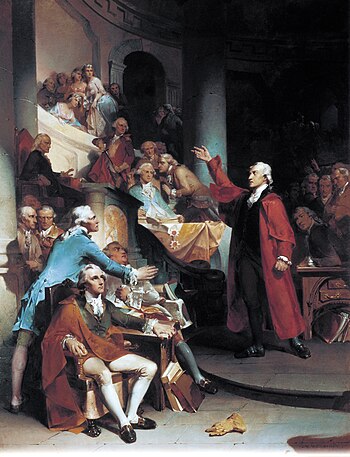Virginia Resolves
- This page is about the pre-revolutionary resolves against the Stamp Act, for the later resolution against the Alien and Sedition Act, see Virginia Resolution:

The Virginia Resolves were a series of resolutions passed by the Virginia General Assembly in response to the Stamp Act of 1765. The Stamp Act had been passed by the British Parliament to help pay off some of its debt from its various wars, including the French and Indian War ostensibly fought to protect the American colonies.
The resolves claimed that Virginia was an independent realm of the British Crown, subject to taxation only by its colonial assembly and not by Parliament. Two articles did not pass: one urged civil disobedience of the Act, and another, echoing a 1629 resolution against Charles I of England, equated support of the Act to rebellion against the colonial authorities. These rejected articles mistakenly appeared in some newspapers.
On May 29th, 1765, Patrick Henry made one of his famous speeches before the Virginia House of Burgesses to encourage the passage of the resolutions. Henry said "Caesar had his Brutus, Charles I his Cromwell, and George III... (Henry was interrupted by cries from the opposition)… may profit by their example. If this be treason, make the most of it." (Some historians consider the last sentence to be a later fabrication). When Patrick Henry paused after the vibrant portion of the speech. Speaker John Robinson stood and shouted, "Treason! Treason!". Patrick Henry at this point issued a semi-apology. Later Speaker Robinson decleared, "twenty ayes and nineteen nays"...
Peyton Randolph later told his young cousin Thomas Jefferson who was standing in the doorways of the House quite frequently. "By God, I would have given 500 guineas for a single vote".
Henry had waited for most of the more conservative members of the assembly to be away before submitting the resolves. The Burgesses generally voted along geographic lines with eastern Virginians opposing the resolves and central Virginians supporting them. Patrick Henry left Williamsburg, Virginia that night fearing the powerful members of the House would harass him with a warrant.
The day after Patrick Henry's speech, Peyton Randolph tried to set a vote to remove the House's journals from May 29th, 1765. But Patrick Henry's political allies such as John Fleming and George Johnston and others stood behind the absent Patrick Henry.
According to several sources, the passage of the Virginia Resolves set off the general opposition to the Stamp Act. Governor Thomas Hutchinson of Massachusetts stated that "Nothing extravagant appeared in the papers till an account was received of the Virginia Resolves." Later Edmund Burke linked the resolves with the beginning of the opposition to the Stamp Act that would contribute to the American Revolution.
